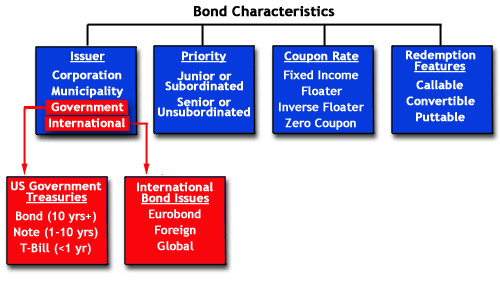Concept Bond Investing
Post on: 17 Сентябрь, 2015 No Comment

A bond is a type of debt. It’s a loan from an investor to an institution, and in exchange the investor collects a predetermined interest rate. When a company needs capital to expand its business, it issues bonds to the public. Investors buy them with the understanding that they will collect the original principal plus interest when the bond matures at a set date. Federal, state, and municipal governments issue bonds for a similar purpose, to raise money for projects and public programs.
Types of Bonds
Bonds or Stocks?
Making the choice between stocks and bonds can be complex. In general, though, the key consideration is your own planning horizon.
Bonds are, in general, more predictable than stocks, and (on average and in general) give you lower returns. If you believe you’ll need predictable access to money over, say, a 20-year period, you may be better off with bonds. For example, if you want to put aside a specific amount of money for a grandchild, expecting that money to be available for college in eighteen years, and not expecting to have other capital available. Insurance companies invest heavily in bonds for just this reason: it matches predictable liabilities (future insurance claims) against predictable cash flows (principal and interest ).

Some bonds have tax advantages ; for example, municipal bonds are typically exempt from state taxes in the state that issued them, as well as federal taxes. This can make them more attractive, though often you will find that the market has arbitraged away the difference, and that corporate (that is, taxable) bonds carry a higher gross yield — and the same net yield after taxes. Although many investors invest in munis for just this reason — they don’t like the taxman — they may not be making the optimum investment choice.
Bonds are not riskless, however. They carry credit risk (will I get my money back?), prepayment risk, liquidity risk and interest-rate risk. Many bonds give the bond issuer the right to repay the bond early — which happens more often when rates are low, in other words, just when you don’t want your money back. This is prepayment risk. Liquidity risk is the risk that you won’t find a good price for your bond when you want to sell it — because there are so many more bond issuers than stock issuers, and because bonds are not exchange-traded, there may not be a willing buyer. Interest-rate risk is the opposite of prepayment risk: when rates go up, the value of your bond will drop (it drops more, the further away it is from maturity). If your circumstances change and you need to sell the bond before maturity, you can lose capital that you would otherwise receive, if you held the bond to maturity.














